Centre for Policy Development's Blog, page 22
November 25, 2019
CPD welcomes release of Shergold Review and its blueprint for investing in refugees and in Australian | MEDIA RELEASE
The Centre for Policy Development (CPD) welcomes the release of “Investing in Refugees, Investing in Australia”, the findings of the Review into integration, employment and settlement outcomes for refugees and humanitarian migrants to Australia, chaired by Peter Shergold AC.
“Releasing the Shergold Review, however belatedly, is an important first step. Its principles and recommendations were based on wide consultations, and should resonate with Australian communities. It can now inform discussions on how to best settle our most vulnerable arrivals.”
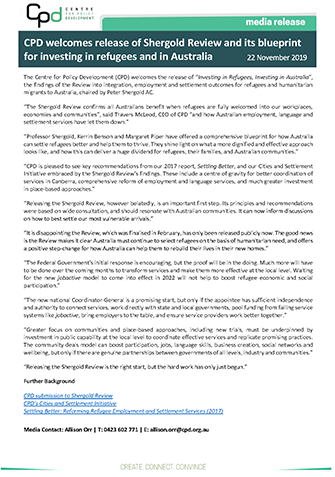
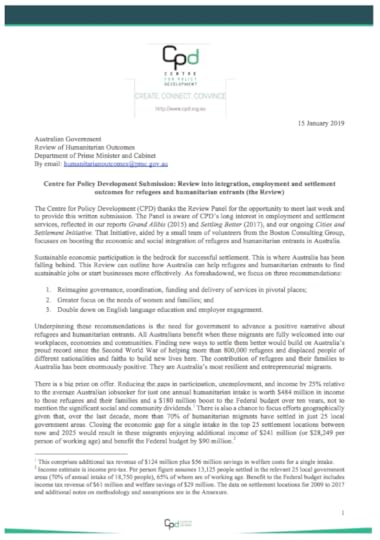
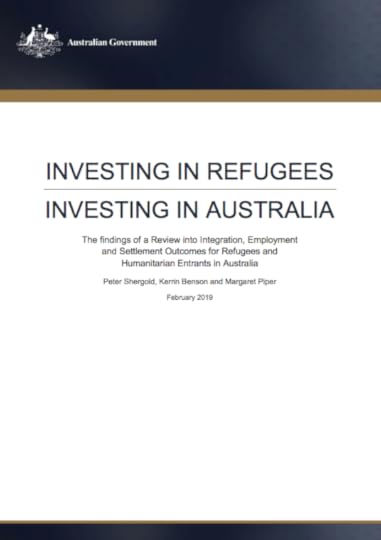
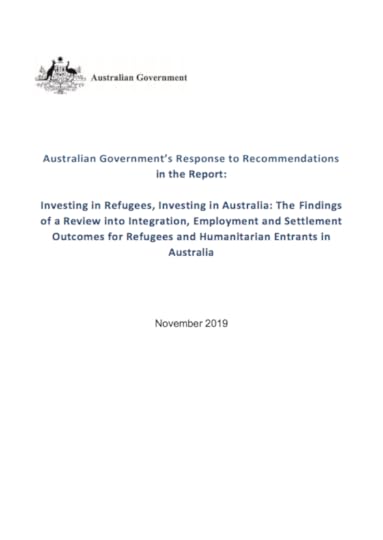
Click here to view the PDF of CPD’s media release
Click here to read CPD’s full submission to the Review
Click here to read the full review, Investing in Refugees, Investing in Australia
Click here to read the Government’s response to the Review’s recommendations
The review recognises that despite a proud settlement record, we can do much better to support refugees to make the most of their strengths, skills and experience, as early as possible in their settlement journey. The opportunity cost of not doing so, as signalled in the Settling Better report of 2017, is too high.
The Review’s recommendations embrace much of the vision and blueprint for greater economic and social participation for humanitarian migrants advanced through the Cities and Settlement Initiative and Settling Better . The Government response has endorsed and supported this vision and the key priority now will be implementing the blueprint in full to make this vision a reality.
Chief among the priorities at hand is building a centre of gravity for refugees in Canberra, to coordinate employment, settlement and language services, and to make sure the efforts of state and local government, industry and the community sector are joined up and complementary. Current arrangements under the Minister for Immigration, Citizenship, Migrant Services and Multicultural Affairs, and within the Department of Home Affairs, as well as appointing a Coordinator-General for Migrant Affairs in the department, will go part of the way to achieving the centre of gravity needed. It will be important that the right governance and advisory bodies are in place to bring in the voice of refugees, business, civil society and state and local government counterparts. Also that the relevant senior official has the independence, resources and authority needed to implement significant improvements to capability, services and partnerships needed.
Central to the vision, and to CPD’s work, is helping refugees into suitable and sustainable work, self-employment and small business sooner, and supporting them to grow and develop in their careers. Given the complex needs of refugees, this not only requires the key services to be working much more seamlessly together but also comprehensive reform to employment and language services so they are more effective in adapting to local circumstances and an individual’s journey.
A patchwork service system, including the enhanced employment service (or reformed jobactive) slated for July 2020, other Commonwealth and state employment related programs, and a maze of language and settlement supports, will simply not deliver what’s needed. As advocated by CPD, the review recommends trialling specialist place-based employment services, that engage all service providers and support organisations in delivering on a refugee’s personal plan and desired outcomes, and meeting the needs of local employers. This approach is being trialled by Wyndham City Council and partners, and supported by CPD in the Improving Economic Participation for Refugees project. The project was profiled in the Government’s response to the Shergold review.
The Community Deals model, emerging from the Cities and Settlement Initiative , provides the structure and operating model to replicate and expand these place-based initiatives in the location settling the most refugees across Australia. Place-based approaches also provide the opportunity to harness the goodwill and resources of Australian communities to support refugees settling in their local areas, including in our regional towns.
The review has done an excellent job at gathering the analysis and good practice of actors across Australia and weaving a comprehensive vision for greater refugee economic and social integration. It aligns strongly with CPD’s thinking. The job at hand is to make that vision a reality through the implementation of the full blueprint for action recommended.
Media coverage
Helping refugees find work, Stephanie Borys, ABC AM, 23 November 2019
Government wants half of new refugees to be settled in ‘regional’ Australia by 2022, Michael Koziol, Sydney Morning Herald, 22 November 2019
Secret report urged Morrison government to create ‘more positive narrative’ on refugees, Michael Koziol, Sydney Morning Herald, 29 September 2019
The post CPD welcomes release of Shergold Review and its blueprint for investing in refugees and in Australian | MEDIA RELEASE appeared first on Centre for Policy Development.
November 24, 2019
The Australian criminal justice system and deep disadvantage I ANU-CPD Policy Dialogue I November 2019
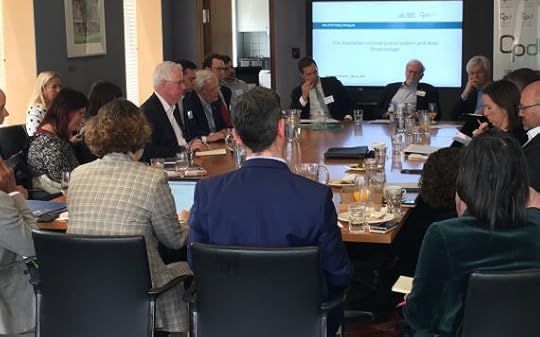
On 15 November, we hosted our fourth ANU-CPD Policy Dialogue for 2019. Our focus was the Australian criminal justice system and deep disadvantage. The roundtable discussion featured opening remarks from Professor Lorana Bartels (Program Leader of Criminology, Australian National University), Krystal Lockwood (Ph.D. Candidate, Griffith University), John Spierings (Executive Officer, Reichstein Foundation), Jacinta Pollard (Managing Director, Caraniche) and Marlene Morison (Former Corrections Commissioner, Queensland).
The roundtable was jointly hosted by CPD with ANU Chancellor and former Foreign Minister, the Hon Gareth Evans AC QC, and brought together 25 leaders from government, philanthropy, civil society and academia. The roundtable was moderated by CPD’s CEO Travers McLeod and held under the Chatham House Rule. The interactive discussion was a chance for policymakers, service providers, community organisations, academics, philanthropists, and government to discuss what might be done to address the over-representation of marginalised people in our criminal justice system, and how best to address systemic policy problems created by gaps in government service delivery.
Discussion
The discussion opened with expert participants giving an outline of the current state of the sector, including the slow progress on enacting the recommendations from the Australian Law Reform Commission’s Pathways to Justice Inquiry, the over-representation of Aboriginal and Torres Strait Islander peoples in the criminal justice system, the increasing rate of incarceration of women, the challenges of providing support to people in the criminal justice system, the system-level obstacles to reform facing policymakers, and the challenges of designing reforms that include the voice of prisoners and those most impacted by the system. We considered opportunities for the philanthropic sector to champion changes to the criminal justice system and help to de-risk reform in this complex and highly contested policy area.
The following discussion touched on:
Collaborative approaches to identify intervention points and prevent entry into the criminal justice system in the first place, including by working closely with prisoners and their families;
What we know about effective programs and services within the prison system and upon release, including the challenges of engaging industry to employ ex-offenders;
The narrative around the criminal justice system which shapes public perceptions and strategies to re-frame the debate;
The role of place-based approaches, including the importance of data, evidence and evaluation, and the challenge of scaling up pilots; and
The importance of related systems changes to policies and services that interact with Australia’s criminal justice system.
Participants
Abhilash Mudaliar (Impact Investing and Social Ventures, Paul Ramsay Foundation); Andrew Bushnell (Research Fellow, Institute of Public Affairs); Ben Carroll MP (Victorian Minister for Corrections); Cameron Spence (Director, Spence Consulting Group); Catherine Neville (Executive Director, Advocacy and Strategy, Jesuit Social Services); Cliff Eberly (Manager, Social and Economic Inclusion, Wyndham City Council); Dan Nicholson (Executive Director for Criminal Law and for the Western Suburbs Region, Victorian Legal Aid); Emma Cassar (Commissioner, Corrections Victoria); Gareth Evans AC QC (Chancellor, Australian National University); Glyn Davis AC (Distinguished Professor, Crawford School of Public Policy and CEO, Paul Ramsay Foundation); Jacinta Pollard (Managing Director, Caraniche); Jeni Whalan (Chief Program Officer, Paul Ramsay Foundation); Jessica Bartik (Assistant Director, Justice Branch, Victorian Department of Premier & Cabinet); John Spierings (Executive Officer, Reichstein Foundation); Krystal Lockwood (PhD Candidate, Griffith University); Liz Curran (Associate Professor, Australian National University); Lorana Bartels (Professor and Program Leader of Criminology, Australian National University); Marlene Morison (Former Corrections Commissioner, Queensland); Michael Livingstone (Chief of Staff to Minister Ben Carroll MP); Michael Perusco (CEO, Berry Street); Peter Harmsworth AO (Former Director General, Corrections Victoria and CPD Fellow); Rod Marsh (Independent Consultant); Ruth McCausland (Director of Research and Evaluation, Yuwaya Ngarra-li Partnership, University of New South Wales); Simone Gianelli (Head of Strategy and Growth, Save the Children Australia); Stan Winford (Associate Director of Research, Innovation & Reform, RMIT Centre for Innovative Justice); Terry Moran AC (Chairperson, Centre for Policy Development); Travers McLeod (CEO, Centre for Policy Development); Vincent Shin (Senior Lawyer, WestJustice).
The post The Australian criminal justice system and deep disadvantage I ANU-CPD Policy Dialogue I November 2019 appeared first on Centre for Policy Development.
November 21, 2019
Regional Roundtable on Alternatives to Child Detention | 21-22 Nov 2019 | Bangkok
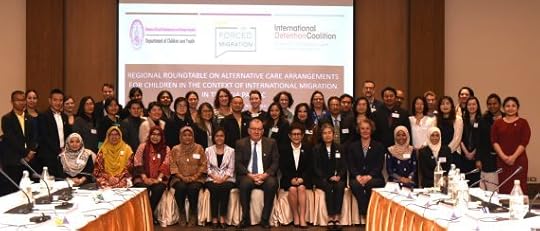
The Secretariat of the Asia Dialogue on Forced Migration (ADFM) was pleased to co-convene a Regional Roundtable on Alternative Care Arrangements for Children in the Context of International Migration in the Asia Pacific. The roundtable was jointly organised by the Department of Children and Youth (DCY) within the Thai Ministry of Social Development and Human Security, and the International Detention Coalition (IDC).
This roundtable was first suggested at the seventh meeting of the ADFM in Bangkok in November 2018, where participants supported the idea of creating a regional peer-learning platform on this issue.
On 21-22 November, thirty-five representatives from implementing and policy agencies within the governments of Thailand, Australia, Malaysia and Indonesia, as well as civil society and international organisations, came together in Bangkok to share their experiences and positive practice and assist each other to meet and address implementation challenges.
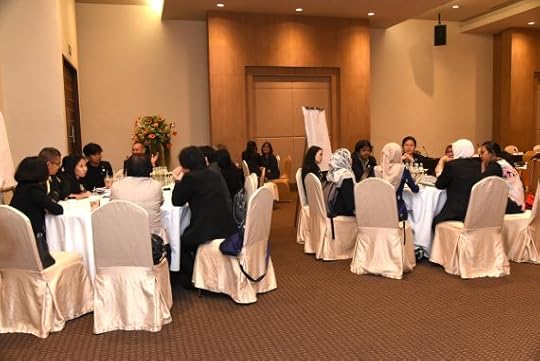
The last time regional governments came together on this issue was in 2015. Now, on the thirtieth anniversary of the Convention on the Rights of the Child, with the Global Compacts receiving widespread support in the region, and following the recent passage of the ASEAN Declaration on the Rights of Children in the Context of Migration, there is a real sense of momentum in the region for action and change.
We were pleased to find a strong desire among participants to develop policies and programming in the best interests of the child, and also welcomed agreement on the benefit of an ongoing peer-learning platform in the region to continue this program of learning and action. Areas of agreement included:
recognition of the need for improved coordination between relevant authorities (among government agencies and between government/non-government) on issues relevant to alternative care in each country;
the desire for further technical assistance and training for front-line staff in dealing with refugee, asylum seeker and migrant children and their families.
Among the tangible ideas that came up for continuing this platform were:
engaging nationally and regionally on the benefits of alternative care arrangements;
building or using an existing online information-sharing platform to exchange positive practice, toolkits, manuals, handbooks and other relevant information;
bilateral country information exchanges and site visits to observe models and programs that could be adapted for other country contexts;
peer-learning through holding further, smaller intra-regional and country-specific meetings on areas of interest;
setting benchmarks for what good practice looks like in inter-agency cooperation on implementing alternatives to detention.
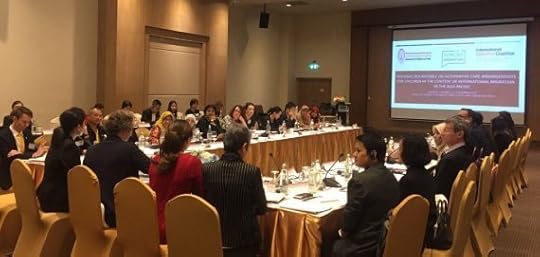
CPD and IDC are grateful to the Thai Department of Children and Youth and the Australian Department of Home Affairs for their support of the meeting, and to Host International and UNICEF Thailand for their expert assistance and coordination throughout the two day event.
More information about the roundtable, including the agenda, participant list and briefing paper can be found here.
The post Regional Roundtable on Alternatives to Child Detention | 21-22 Nov 2019 | Bangkok appeared first on Centre for Policy Development.
Regional Roundtable on Alternatives to Child Detention | Nov 2019 | Bangkok
The Asia Dialogue on Forced Migration (ADFM) is pleased to co-convene a Regional Roundtable on Alternative Care Arrangements for Children in the Context of Migration in the Asia Pacific. The roundtable is being jointly held by the Royal Thai Government Department of Children and Youth, and the International Detention Coalition.
This roundtable was first suggested at the seventh meeting of the Asia Dialogue on Forced Migration (ADFM) in Bangkok in November 2018, where participants supported the idea of creating a regional peer-learning platform on this issue.
The last time regional governments came together on this issue was in 2015. Now, on the thirtieth anniversary of the Convention on the Rights of the Child, with the Global Compacts receiving widespread support in the region, and following the recent passage of the ASEAN Declaration on the Rights of Children in the Context of Migration, there is a real sense of momentum in the region for action and change.
Over the past year IDC and ADFM have been working with the Department of Children and Youth in the Thai Ministry of Social Development and Human Security to put together the two day roundtable and site visit. Thirty-five representatives from implementing and policy agencies within the governments of Thailand, Australia, Malaysia and Indonesia, as well as civil society and international organisations, are coming together in Bangkok to share positive practice and assist each other to meet and address implementation challenges.
The post Regional Roundtable on Alternatives to Child Detention | Nov 2019 | Bangkok appeared first on Centre for Policy Development.
October 27, 2019
Workshop on Building Institutional Capacity for Regional Migration Governance | 13 September
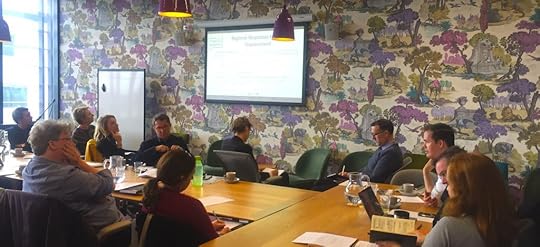
On 13 September, the Centre for Policy Development joined academics and experts from Southeast Asia and the United Kingdom for a workshop on Building institutional capacity for regional migration governance: Collective problems and competing norms at the University of Melbourne.
The full-day workshop, supported by the Peter McMullin Centre on Statelessness at Melbourne Law School, brought together researchers and practitioners from five countries to discuss shared challenges in the region. Attendees included representatives from Australian Red Cross, the Asylum Seeker Resource Centre, Host International, and academics from Chulalongkorn University, Universiti Kebangsaan Malaysia, Gadjah Mada University, University of Southampton and the University of Oxford Refugee Studies Centre.
CPD’s CEO Travers McLeod began the day by introducing the work of our track two process, the Asia Dialogue on Forced Migration (ADFM), in advancing collaborative responses to the region’s largest human displacement and human trafficking challenges. Dr. Terry MacDonald and Prof. Adrian Little from the University of Melbourne School of Social and Political Sciences co-hosted the workshop.
The post Workshop on Building Institutional Capacity for Regional Migration Governance | 13 September appeared first on Centre for Policy Development.
October 4, 2019
12 Year Action Plan for Africans in Victoria
Many African-Australians from across different fields in Victoria have been working for over two years to develop a 12-year plan to uplift other Africans in Victoria.
This plan is aimed at increasing economic prosperity, educational levels and community participation amongst African-Australians.
Among those involved in this action plan is Hussein Haraco, who was originally from Somalia but came to Australia in 2001 and has since then showcased the entrepreneurial spirit that many refugees possess.
In the 17 years Mr Haraco has lived in Australia, he has not worked for anyone else but has provided employment for many others.
Mr Haraco has established his own business importing food and drinks, as well as having real estate interests and running a pizza and billiards parlour.
Ahmed Hassan, who also forms part of this group, has advocated for the need for action and for empowering other young African Australians.
Since leaving high school, Hassan has established a rehabilitation and employment program for disadvantaged youth which has helped thousands and also seeks to build future leaders.
The success stories of many more African Australian refugees who have collaborated in the action plan can be read about further in the article linked below.
The post 12 Year Action Plan for Africans in Victoria appeared first on Centre for Policy Development.
Karen Refugees in Nhill
The country town of Nhilll, which used to be a centre of prosperity, was in the process of decline but the arrival of 200 Karen refugees from Myanmar has revitalized this small community.
Luv-a-Duck was an instrumental part of this resettlement process, as this business provided newly arrived Karen refugees with opportunities for meaningful work.
By June 2010, other businesses besides Luv-a-Duck had begun employing Karen refugees and more than nine families had bought their own homes.
As of 2018, there are 50 Karen refugees working at the processing plants, which is more than a quarter of their 180-person workforce and the business has been booming ever since.
It has been reported by Deloitte Access Economics and the AMES settlement agency that the program with Luv-a-Duck has provided a boost of over $40m to the local economy of Nhill.
This community not only provided employment for these refugees, as the Nhill Learning Centre also offers important classes in language, lifestyle and finances for Karen people.
Aside from all the economic benefits of refugee resettlement, the smooth social integration of the Karen people into the Nhill community has also been remarkable.
With many of these refugees coming from isolated villages, the peace and quiet of Nhill was more suited to their lifestyle.
Additionally, around 30 local people were approached to become mentors to newly arrived families which gave refugees a friendly face to turn to for help.
Becoming a hub of resettlement for Karen people, these refugees now make up 10 per cent of the population.
The Nhill community, who were once largely unaware and indifferent to the plight of refugees, have also become more informed about the hardships refugees endure with the arrival of the Karen people.
The post Karen Refugees in Nhill appeared first on Centre for Policy Development.
September 29, 2019
Fourth ‘Mini’ Meeting | Council on Economic Participation for Refugees | August 2019
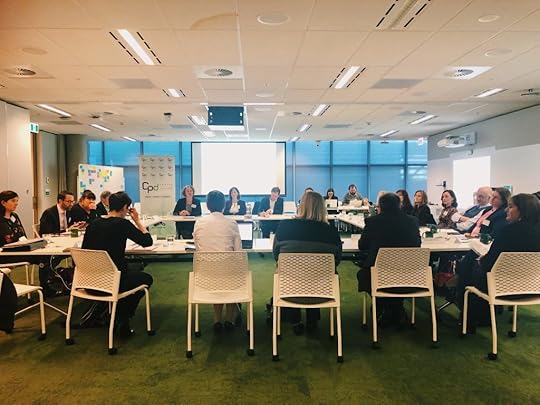
Key documents:
Agenda
Participants list
Briefing materials
Meeting summary
The fourth ‘mini’ meeting of the Council on Economic Participation for Refugees was held on 8 August 2019 at the Canberra office of the Boston Consulting Group. Building on the momentum from the meeting in April 2019, this meeting sought to further the opportunities created by the centre of gravity for humanitarian settlement services in the Department of Home Affairs.
The objectives of the fourth Council meeting were to:
Identify opportunities to implement ‘Community Deals’ at a local level to lift economic and social participation for humanitarian migrants.
To picture the ideal 2022 service delivery system to boost economic participation for refugees and the opportunities for iterating towards that system at the local and national levels.
Further information on the meeting, including the participants, agenda, briefing materials and meeting summary, can be found in the above links.
To read more about the third meeting in Canberra in April 2019 click here.
To read more about the second meeting in Fairfield in September 2018 click here.
To read more about the first meeting in Melbourne in February 2018 click here.
The post Fourth ‘Mini’ Meeting | Council on Economic Participation for Refugees | August 2019 appeared first on Centre for Policy Development.
September 3, 2019
Climate Risk Update: Regulators in ‘lock-step on climate change’
Australia’s financial regulators continue to step up their leadership on climate change. Three key developments in August 2019 built on CPD’s research and series of landmark public statements on climate risk that we hosted in the last two years.
Australia’s corporate regulator ASIC issued comprehensive Updated Guidance on Climate-Related Disclosure on how companies should report climate-related risks to their operations, highlighting the critical role of the global Taskforce for Climate-related Financial Disclosures framework.
In a speech outlining Risks to the Outlook for Australia’s economy, Reserve Bank Deputy Governor Dr Guy Debelle emphasised the long-term material risk of climate change for Australia’s economy, reinforcing the key messages from his speech at CPD’s public forum on climate and the economy earlier in 2019.
In addition, in a speech titled ‘Reflections on a changing landscape’, APRA Chairman Wayne Byres said:
“We are now in a world where climate-related financial risks need to be assessed and addressed alongside more traditional balance sheet and operational risks”
And in another connection to CPD’s work in this area, he spoke of a growing understanding that directors’ duties require boards to be cognisant of the climate risks to which their business is exposed.
As The Australian noted last month, while climate policy remains deadlocked, our financial regulators are now in lock-step in highlighting the risks, obligations and opportunities stemming from a zero-carbon transition.
CPD’s Policy Director Sam Hurley spoke about the implications for leadership and directors’ duties at our public forum earlier this year. Our CEO Travers McLeod also discussed the updated legal opinion on directors’ duties and climate change with the ABC’s Peter Ryan.
The post Climate Risk Update: Regulators in ‘lock-step on climate change’ appeared first on Centre for Policy Development.
July 1, 2019
Eighth meeting | ASIA DIALOGUE ON FORCED MIGRATION | June 2019

Key documents for the eighth ADFM meeting:
Full agenda and participant list
Participant profiles
Briefing Papers
Co-Convenors’ Statement
The eighth meeting of the Asia Dialogue on Forced Migration (ADFM) was held from 27-29 June 2019 in Jakarta, Indonesia. The meeting comes after the 34th ASEAN Summit in Bangkok and the Bali Process Trafficking in Persons Working Group in Jakarta, held in the week prior. Our meeting was supported by the Indonesian Ministry of Foreign Affairs (KEMLU) and our Indonesian co-convenor, the Indonesian Institute of Sciences. It provided an important opportunity for the exchange of ideas and new approaches as we strive for more effective, durable and dignified approaches to our shared forced migration challenges.
It also provided the opportunity, including through a special ASEAN reception, for the ADFM Secretariat and members to connect with ASEAN Permanent Representatives and the ASEAN sectoral bodies focussed on transnational crime, human rights, women and children. We discussed how ASEAN can step up its role in migration governance in the region, particularly in relation to refugees and migrants at risk.
The meeting focussed on:
The future of regional governance of refugees and migrants at risk, including implementation of the Global Compacts on Migration and Refugees, and the roles of ASEAN and the Bali Process and their ongoing collaboration;
The future of regional practice in responding to the protection challenges of refugees and migrants at risk, particularly with regard to alternatives to the detention of children, trafficking in persons, and return and reintegration; and
Coordinated responses to mass displacement in Myanmar and Bangladesh, including to the identified risks of trafficking in persons.
We were pleased to find a strong desire among ADFM members to meet the aspirations and objectives of the Global Compacts on Refugees and Migration in the region. Indeed, there are already many ways in which our agencies, countries and regional forums are stepping up to the task, through advances in both governance and practice. And there’s more we can do. We will continue to find innovative ways to elevate the issues in regional institutions, and build on the good work in the region to strengthen the protection system for refugees and migrants at risk.
Mass displacement of the Rohingya in Myanmar and Bangladesh, and the risks that displacement presents, continues to be a key challenge for the region. Despite the complexity, we were pleased to make some progress toward the region tackling that challenge in a coordinated way.
We developed concrete plans to respond to other significant protection issues in the region, including on good practice alternatives to child detention, prevention and countering trafficking in persons, and opportunities for work and livelihoods for refugees and migrants at risk.
Our ninth ADFM meeting, is likely to take place in February/March 2020.

The post Eighth meeting | ASIA DIALOGUE ON FORCED MIGRATION | June 2019 appeared first on Centre for Policy Development.
Centre for Policy Development's Blog
- Centre for Policy Development's profile
- 1 follower



